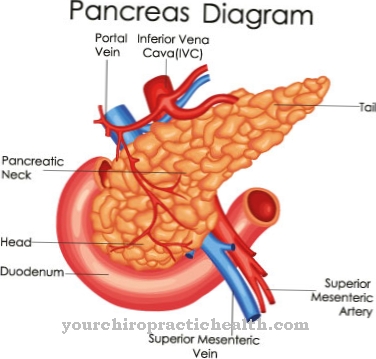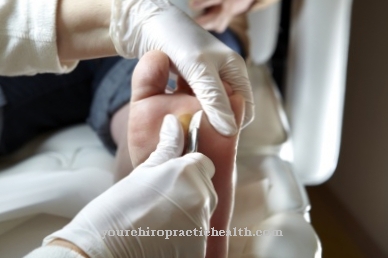The Amniotic Infection Syndrome represents a serious complication during pregnancy or childbirth. It is a serious bacterial infection of the placenta, egg cavity, membranes and possibly the fetus, which must be treated immediately to save the lives of mother and child.
What is Amniotic Infection Syndrome?

Amniotic infection syndrome usually occurs in the last phase of pregnancy or during the labor process. It is often triggered by bacteria entering the vagina from outside, which have free access to the placenta, the membranes, and the child. Since the membranes are also affected, the term is also used as a synonym Chorioamnionitis used.
Amniotic infection syndrome is a medical emergency that can be dangerous for both mother and child. This disease is not triggered by a single pathogen. Rather, different types of bacteria can lead to the same symptoms. These pathogens include beta-hemolytic streptococci, intestinal bacteria such as Escherichia coli, staphylococci, listeria, hospital germs such as Pseudomonas aeruginosa, Klebsiella, and fungus-like bacteria such as mycoplasmas, gonococci or chlamydia.
Before the infection, the germs stay in the area of the rectum or vagina. If the amniotic sac prematurely ruptures and the cervix opens, the pathogens can freely rise into the placenta and infect the membranes, placenta and even the child. Even if the amniotic sac is intact, infection of the placenta, the membranes and the child via the bloodstream is possible.
causes
Amniotic infection syndrome is usually caused by a bacterial mixed infection with different pathogens. As already mentioned, several different types of pathogens can be considered. The prerequisite for an infection is either free access for the germs from the outside via the vagina, ascending through the cervix, or via a hematogenous route from a focus of infection within the organism to the placenta.
In the first case, the cause is a prematurely ruptured amniotic sac. The fetus swimming in the amniotic fluid is protected from external influences by the amniotic sac. At the same time, it is fed and supplied with oxygen via the umbilical cord. If too much time passes between the bursting of the amniotic sac and the birth, the conditions for an infection of the placenta, the membranes or even the unborn child with various germs via the vagina become more and more favorable.
The premature rupture of the bladder also leads to the loss of amniotic fluid and has a negative impact on the growth of the fetus, so that it becomes susceptible to germs in addition to disturbing its development. If the amniotic infection syndrome is transmitted via the blood, the amniotic sac has not yet burst. In this case, however, there is a secondary risk of premature rupture of the bladder as a result of the amniotic infection syndrome.
Symptoms, ailments & signs
Amniotic infection syndrome is characterized by inflammation of the membranes, cervix, and uterus. The inflammation of the membranes can trigger premature labor and lead to premature delivery. The newborn child is seriously ill and can die from so-called sepsis (blood poisoning). Sepsis is a very serious medical emergency because it causes massive amounts of bacteria to enter the bloodstream.
If the child survives sepsis, physical and mental impairment may remain due to premature birth and the effects of amniotic infection syndrome. The pathogens can also cause meningitis and severe respiratory diseases in the child. In the mother, the inflammation of the lining of the uterus can also lead to sepsis, which is also a deadly danger for the pregnant woman.
Even without sepsis, severe symptoms occur in both the child and the mother. The unborn child has an increased heart rate (tachycardia). The mother has a fever, uterine pain during palpation, premature labor and leukocytosis (increased production of white blood cells). In addition, there is foul smelling discharge of amniotic fluid.
Diagnosis & course
The diagnosis of amniotic infection syndrome is made based on symptoms and blood tests. If the amniotic sac breaks prematurely, the inflammation values in the blood must be constantly determined, the heart rate continuously monitored and the body temperature of the pregnant woman measured. If the values rise, this is considered a sign of the onset of amniotic infection syndrome.
Other indications are foul smelling amniotic fluid and pain when touching the uterus. Even if the amniotic sac has not yet burst, if these symptoms occur, everything indicates an amniotic infection syndrome.
Complications
Amniotic infection syndrome can affect women during pregnancy. This is a germ-caused infection of the membrane surrounding the amniotic fluid in the fetus. The pathogens can cause numerous complications and, in extreme cases, trigger an abortion or sepsis.
They consist of a mixed infection of streptococci, listeria, chlamydia and enterococci and find their way through the cervix and vagina into the uterus. If a pregnant woman falls ill with amniotic infection syndrome, medical countermeasures must be initiated immediately. Typical signs are fever, sudden labor, tachycardia, and increased uterine pressure.
The treatment depends on the status of the pregnancy and whether the urinary rupture has already occurred. In most cases, high-dose antibiotic therapy is injected into the vein. If the 36th week of pregnancy has passed and the fetus is fully developed, the birth can be induced artificially. If the mother is too weakened by the amniotic infection syndrome, a caesarean section is recommended.
However, if the pathogens cause complications or a rupture of the bladder between the 28th and 36th week of pregnancy, the life of the unborn child is at risk. During this time, the lungs are not yet fully developed. Only in particularly severe cases will attempts be made to fetch the child, who then has to be looked after intensively on the premature baby ward.
When should you go to the doctor?
In any case, the amniotic infection syndrome must be treated immediately.As a rule, the child and mother die directly without treatment, which is why early diagnosis and treatment are extremely important for the further course of this disease. As a rule, the mother has a severe fever and pain in the uterus due to the amniotic infection syndrome. Should these symptoms occur during pregnancy, a doctor must be contacted in any case.
The amniotic infection syndrome can be determined by a blood test. It is not uncommon for premature labor to occur or for an amniotic sac to burst prematurely. If these symptoms occur, an emergency doctor must be called immediately or the hospital must be visited. If the patient is not sure about the symptoms, a check-up can be carried out at the gynecologist. Even with an increased heart rate, the amniotic infection syndrome can be responsible for the symptoms. The further course and treatment of the disease generally depend on the current condition and progress of the pregnancy.
Doctors & therapists in your area
Treatment & Therapy
When treating amniotic infection syndrome, it is necessary to weigh up between maternal and child risk. It depends on the stage of development of the fetus at which the infection occurs. The further away from the calculated due date, the more immature the child is. If 36 weeks of pregnancy have already passed, the birth must be induced artificially immediately.
The child's heart rate is constantly monitored, the body temperature is checked and antibiotics are injected intravenously. Antibiotic therapy must be continued after the birth until the inflammation levels have subsided. The mother is also treated with antibiotics.
If the amniotic infection syndrome occurs between the 28th and 36th week of pregnancy, depending on the child's level of development, it may be necessary to induce lung maturation with cortisone before the birth can be initiated. Before the 28th week of pregnancy, it may be necessary to terminate the pregnancy prematurely in order to save the mother's life.
Outlook & forecast
The amniotic infection syndrome is a very serious illness which, if left untreated, can in the worst case lead to death. Those affected can die mainly due to blood poisoning, so that the life expectancy of the patient is significantly reduced in most cases.
If the child survives this disease after birth, then in most cases there will be relatively severe physical and psychological limitations. Mental restrictions also occur and can make everyday life for the person affected significantly more difficult. Furthermore, inflammation occurs in various areas of the body. In some cases, the mother can also die from amniotic infection syndrome. The mothers mainly suffer from high fever and pain in the uterus. It is not uncommon for this or the death of the child to lead to significant psychological complaints or to depression.
Treatment of amniotic infection syndrome is done with the help of antibiotics and can lead to success. However, a general prediction of the course of the disease is usually not possible. In some cases, the pregnancy can also be terminated, which, however, can lead to severe psychological complaints in many patients.
prevention
The prevention of an amniotic infection syndrome occurs in the event of premature rupture of the bladder by constant monitoring of heart rate, body temperature and inflammation levels in the blood. Regular medical check-ups are recommended even if the pregnancy is uncomplicated.
Aftercare
In the case of an amniotic infection syndrome, the affected child and mother have no special options for follow-up care. As a rule, no special aftercare is possible, since the poisoning can be treated relatively well. The child must take antibiotics, which are given directly into the blood.
In addition, artificial respiration may be necessary to keep the child alive. In most cases, the amniotic infection syndrome then heals completely without complications. An early diagnosis and treatment in the case of amniotic infection syndrome always have a very positive effect on the further course of the disease.
The poisoning can be diagnosed and treated before birth. Treatment with the help of antibiotics is also possible here, whereby it is important to ensure that the antibiotics are taken regularly. Alcohol should also be avoided.
Another late sepsis can be avoided by observing hygiene standards. In the case of amniotic infection syndrome, contact with other affected persons can also be useful, as this can often lead to an exchange of information, which can also prevent psychological complaints.
You can do that yourself
Amniotic Infection Syndrome affects pregnant women and their unborn children, and both sides are at risk. The serious inflammatory disease represents an acute emergency, so that the patients immediately contact an emergency doctor and go to a medical clinic, even if they have mild symptoms. In principle, doctors diagnose the disease during preventive examinations for pregnant women, so that timely intervention is often possible. This presupposes that women attend all check-ups offered by the gynecologist and report complaints.
At best, patients remain in the hospital during the illness and receive intensive care from doctors and staff. The primary aim of this therapy is to prevent the mother or child from developing sepsis or to intervene early. If blood poisoning develops, a caesarean section is often necessary.
In general, patients try to allow themselves plenty of rest and get enough sleep during their stay in the clinic. In most cases, those affected are given special antibiotics, the effects of which on the mother and the unborn child are constantly monitored by the doctors. After the birth, mother and child usually stay in hospital longer than in healthy women giving birth. Due to illness, the newborns are often premature babies that require appropriate care.






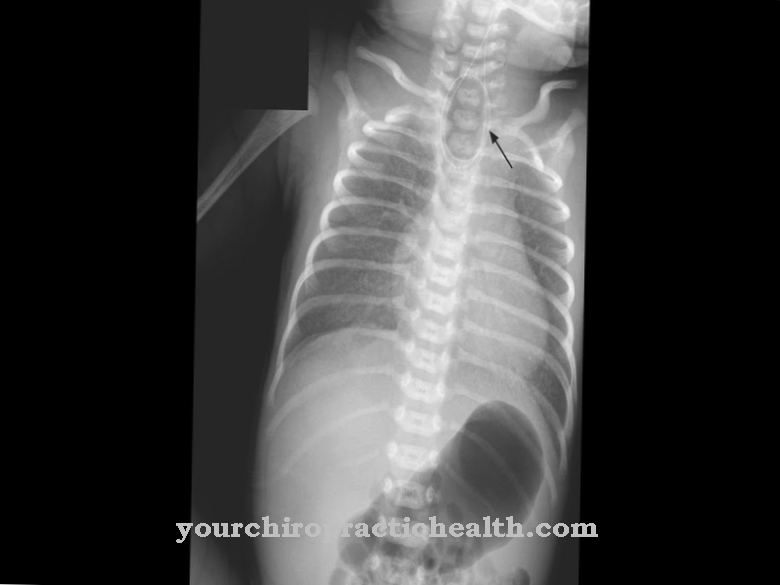






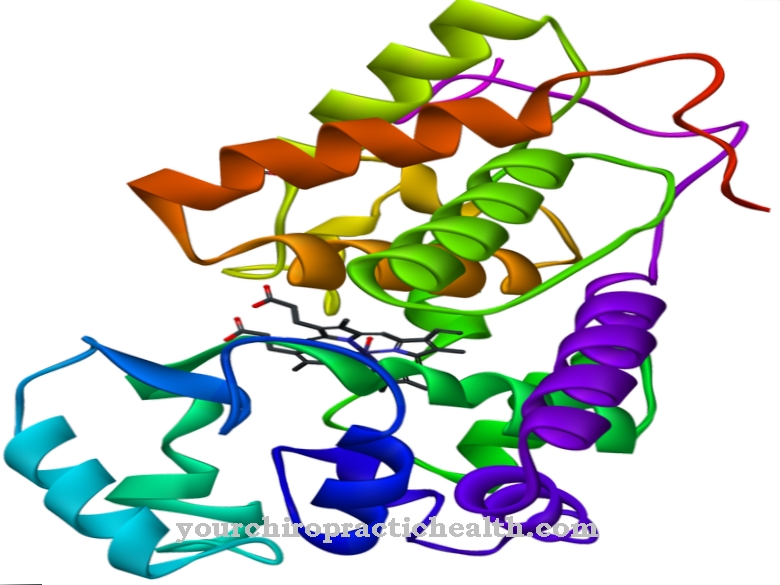

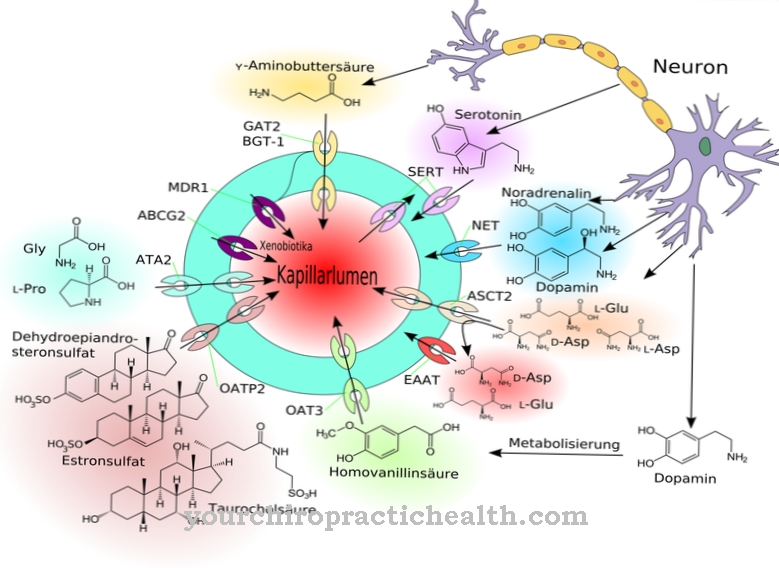
.jpg)
.jpg)



.jpg)


